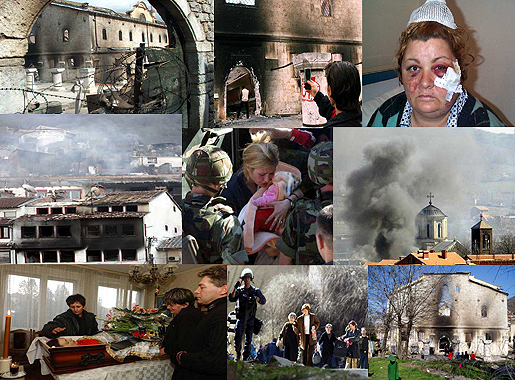On the occasion of the 15th anniversary of the Pogrom on Kosovo and Metohia
 On the 17th of March 2019 it is 15 years since from the Kosovo and Metohija, in destructive attacks by Albanian extremists, 4,012 Serbs were expelled, most of them have not still returned to their homes.
On the 17th of March 2019 it is 15 years since from the Kosovo and Metohija, in destructive attacks by Albanian extremists, 4,012 Serbs were expelled, most of them have not still returned to their homes.
In a wave of violence in Kosovo and Metohija 19 people were then killed, eight of them Serbs, while 11 Albanians were killed in the clash with members of the international security forces. At least 170 Serbs were injured as well as dozens of members of the international forces who clashed with local Albanians while protecting Serbs and their property. About 800 Serbian houses were destroyed and 35 religious shrines were burned, including 18 cultural monuments, among which the Church of Our Lady of the Levish in Prizren.
This church is one of the most representative monuments of medieval Serbia, being Bishop’s residence in the Middle Ages, acquiring its monumental forms in the time of King Milutin (1282-1321), although it had previously been a seat of the Prizren Bishop of the Serbian Church. The church was somewhat restored, the first Divine Liturgy was officiated in it six years later, but traces of the devastation and fire have not been eliminated. This shrine was included in the list of monuments under the protection of UNESCO in 2006.
Extremists specifically attacked Serbian Orthodox churches; they destroyed 35 churches and monasteries, and in these unprecedented acts of vandalism, - destruction of some was broadcast live on local television on Kosovo (such as in Podujevo), - numerous icons and immovable cultural treasuries, that have survived centuries of Ottoman occupation and World Wars, have been forever destroyed.
The Seventeenth March 2004 particularly painfully affected the Serbian people and its Church because all this happened not during the chaos of a war, but in the presence of thousands of international peacekeepers: KFOR, the Kosovo Police and UNMIK none of whom publicly claimed responsibility for numerous omissions.
According to the data of the Serbian Orthodox Diocese of Raska-Prizren ofApril 2004, the total number of destroyed church buildings was near 100. International prosecutors and judges on Kosovo and Metohija have processed seven cases for destruction of churches and sentenced 67 persons to prison terms ranging from 21 months to 16 years.
The reason or excuse for the pogrom was the campaign of the Albanian media according to which the local Serbs and their dogs chased across the river Ibar a group of Albanian children from the village of Cabar near Zubin Potok, one of whom was drowned in the river, which was not true. UNMIK investigation police established that the allegations were false, and a spokesman for the International Police Neridž Sing said at that time that the "surviving boys were under strong pressure from the Albanian journalists and politicians to accuse the Serbs from a neighboring village".
March events on Kosovo were condemned by the UN Security Council, as well as the European Union, and the Parliamentary Assembly of the Council of Europe passed a resolution on 29 April 2004.
- Распето Косово - Crucified Kosovo - Распятое Косово
- Погром на Косову и Метохији
- #NoKosovoUnesco
- Распето Косово – преглед уништених објеката СПЦ од 1999 до 2004. године, (pdf) изд. Епархија рашко-призренска
- ОЕБС: Одговор судског система на мартовске нереде 2004. године, децембар 2005. године: http://www.osce.org/kosovo/17181?download=true
- Извештај мисије ОЕБС-а потврђује да су већина православних гробаља на Косову у жалосном стању: http://www.osce.org/kosovo/84453


